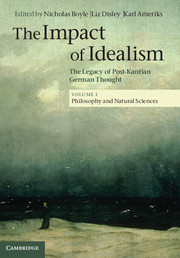Book contents
- Frontmatter
- Contents
- List of Illustrations
- List of Contributors
- Acknowledgements
- List of Abbreviations
- Foreword
- General introduction: the eighteenth and nineteenth centuries
- General introduction: the twentieth and twenty-first centuries
- Introduction: Idealism in the natural sciences and philosophy
- 1 Philosophy of natural science in Idealism and neo-Kantianism
- 2 The impact of German Idealism and Romanticism on biology in the nineteenth century
- 3 The unconscious: transcendental origins, Idealist metaphysics and psychoanalytic metapsychology
- 4 Nietzsche, Kant and teleology
- 5 Transcendental idealism, phenomenology and the metaphysics of intentionality
- 6 Heidegger and the impact of idealism
- 7 French Hegelianism and anti-Hegelianism in the 1960s: Hyppolite, Foucault and Deleuze
- 8 Scottish Idealism
- 9 ‘My station and its duties’: social-role accounts of obligation in Green and Bradley
- 10 Idealism and the origins of analytic philosophy1
- 11 Idealism and Pragmatism: the inheritance of Hegel's concept of experience
- 12 Reason's form
- Bibliography
- Index
- References
6 - Heidegger and the impact of idealism
Published online by Cambridge University Press: 05 December 2013
- Frontmatter
- Contents
- List of Illustrations
- List of Contributors
- Acknowledgements
- List of Abbreviations
- Foreword
- General introduction: the eighteenth and nineteenth centuries
- General introduction: the twentieth and twenty-first centuries
- Introduction: Idealism in the natural sciences and philosophy
- 1 Philosophy of natural science in Idealism and neo-Kantianism
- 2 The impact of German Idealism and Romanticism on biology in the nineteenth century
- 3 The unconscious: transcendental origins, Idealist metaphysics and psychoanalytic metapsychology
- 4 Nietzsche, Kant and teleology
- 5 Transcendental idealism, phenomenology and the metaphysics of intentionality
- 6 Heidegger and the impact of idealism
- 7 French Hegelianism and anti-Hegelianism in the 1960s: Hyppolite, Foucault and Deleuze
- 8 Scottish Idealism
- 9 ‘My station and its duties’: social-role accounts of obligation in Green and Bradley
- 10 Idealism and the origins of analytic philosophy1
- 11 Idealism and Pragmatism: the inheritance of Hegel's concept of experience
- 12 Reason's form
- Bibliography
- Index
- References
Summary
This essay elaborates the impact of idealism on Heidegger's thinking, in the context of the early transcendental and metaphysical phase of his thinking and in the context of his subsequent attempt to think being historically and non-metaphysically. Part I details how Heidegger in that first phase leaves the door open for characterising his own existential analysis and fundamental ontology as a new form of idealism, albeit an idealism with stark similarities to Kant's transcendental idealism. In the second phase, however, in a fit of self-criticism and criticism of Western thinking from its beginning, he rejects idealism tout court, seeing it as a form of Platonism that is oblivious to the historical character of being. After reviewing Heidegger's rendition of how Plato's interpretation of the idea sets the stage for modern idealism, Part II glosses his critical accounts of the pre-absolute and absolute forms of the latter. The third and final part of the essay reviews some implications that Heidegger draws from what he regards as the impact of idealism on Western thought.
I
In SZ, Heidegger's existential analysis, undertaken for the sake of fundamental ontology, has a certain kinship with ‘idealism’, as he understands the concept. This understanding departs from the way the concept was typically understood in his day, namely, as an epistemological doctrine, one that forms the counterpart to realism. Both epistemological doctrines are said to arise from the so-called problem of the reality of the external world. Since any sense of reality presupposes being-in-the-world, Heidegger rejects as senseless any attempt to question or to prove the reality of the external world, or – in the case of Dilthey – merely to explain the source of belief in that reality. These attempts confuse the world-phenomenon (characteristic of Dasein's ‘being-in’) with the being of inner-worldly entities (SZ 202, 206f.). Whether the problem of reality is conceived along strictly epistemological lines or via phenomenological improvements of the concept of subject or consciousness, it fails because the corresponding conceptions of knowing or consciousness lack an appropriate existential analysis.
- Type
- Chapter
- Information
- The Impact of IdealismThe Legacy of Post-Kantian German Thought, pp. 225 - 245Publisher: Cambridge University PressPrint publication year: 2013



